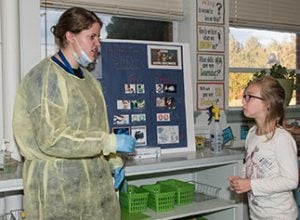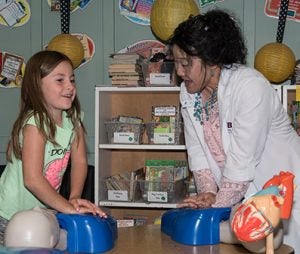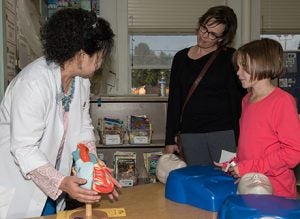School of Nursing students volunteered their time at Garfield Elementary School’s second annual Science, Technology, Engineering, and Math (STEM) Night on October 4. The event was organized in order to show students and families that STEM is accessible and fun, and that Boise State University is a resource for nurturing and supporting STEM pathways.

The event was presented by the College of Health Sciences, College of Education, College of Arts and Sciences, and College of Engineering, as well as several community partners including Micron, the Idaho Botanical Garden and the Boise Astronomical Society.
Julianne Wenner, an assistant professor for the College of Education at Boise State, helped organize the event because she believes it’s important for students and their families to have an opportunity to experience STEM through a variety of fun activities and learn about the community-based STEM careers and educational resources.
“Through our STEM Night we hope that Garfield families will start to create a culture that embraces STEM as a way to problem-solve, think deeply and see the world,” said Wenner.

At one of the School of Nursing’s stations, “How Far Can a Sneeze Go?”, a nursing student dressed up in a gown, gloves, and mask and allowed the children to “sneeze” at her with a spray bottle. This demonstrated to the children just how far an uncovered sneeze can really travel.
The School of Nursing students also provided plastic models of the brain connected to the inner ear as well as a heart for the children to examine, gave demonstrations (complete with special lights and goo) on effective handwashing, and practiced CPR.

Garfield Elementary is a Title I school of about 400 students located on the corner of Broadway and Boise avenue. The school houses several special needs programs serving high needs students including a visually impaired program, a “successful learning classroom” for autistic children, and an“English language learner” classroom serving the refugee and immigrant populations.
The School of Nursing chose to participate in the STEM night because they are an important and visible STEM field.
“Science education is extremely important, and encouraging boys and especially girls to consider the STEM fields is very important,” said Denise Seigart, professor and associate director for the School of Nursing Undergraduate Nursing Program and Master of Nursing of Populations Program. “Many students don’t believe they can be successful in science and math, so we need to show them they can be!”